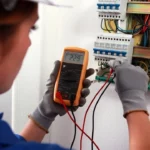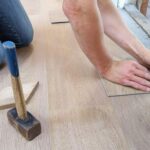Hey there! I’m Sam from Qualify Me!, Australia’s leading RPL (Recognition of Prior Learning) company. If you’ve been working in the construction industry for a while but don’t have formal qualifications, you’re probably already aware of how important a carpentry qualification can be in unlocking new opportunities.
Here at Qualify Me!, I’ve helped hundreds of people just like you turn their hard-earned skills into nationally recognised qualifications. Today, I want to talk about how getting your CPC30220 Certificate III in Carpentry can set you up for a successful career and how you can achieve this qualification quickly without going through years of training.
Why You Need a Carpentry Qualification
Let’s face it—Australia’s construction industry is booming, and qualified carpenters are in high demand. But without formal qualifications, you might be missing out on better pay, more jobs, and higher job security.
As I always say, “A formal qualification doesn’t just validate your skills—it opens doors to bigger and better projects.”
You might already have years of experience, but a nationally recognised carpentry qualification is what employers are looking for. It’s a must if you want to work on major construction sites or start your own carpentry business.
Fast-Track Your Carpentry Qualification with RPL
Here’s the good news: you don’t need to go back to TAFE or spend years in an apprenticeship to get qualified. With Recognition of Prior Learning (RPL), you can use the skills and experience you already have to fast-track your carpentry qualification.
At Qualify Me!, we’ve designed a streamlined process that’s quick and easy:
- Skills Assessment: We start with a free skills assessment to determine your eligibility.
- Portfolio of Evidence: You’ll gather proof of your experience (such as photos of your work, references, and certificates).
- Competency Check: We review your skills and ensure everything meets the standards.
- Get Qualified: Once everything’s in order, you’ll receive your nationally recognised carpentry qualification.
This process could save you years of formal training. And the best part? You’ll be ready to take on bigger roles and increase your earning potential.
"At Qualify Me!, we believe in turning your experience into qualifications fast, so you can keep moving forward in your career without slowing down."
The Skills You’ll Gain with a Carpentry Qualification
When you complete your carpentry qualification, you’ll gain a wide range of practical skills that are essential on any job site:
- Framing and formwork: You’ll learn how to construct the skeleton of buildings, which is a fundamental skill for any carpenter.
- Blueprint reading: Understanding how to read and interpret building plans is crucial for accurate construction.
- Building codes and safety regulations: You’ll be fully aware of Australia’s construction laws and ensure that every project meets safety standards.
These skills will make you stand out from the competition and give you the confidence to take on more complex projects.
Career Opportunities with a Carpentry Qualification
Once you’ve secured your CPC30220 Certificate III in Carpentry, you’ll have access to a wide range of job opportunities:
- Residential Carpenter: Work on homes, renovations, and extensions.
- Commercial Carpenter: Get involved in large-scale construction projects like office buildings, schools, or shopping centres.
- Formwork Carpenter: Specialise in creating the molds for concrete structures, an essential skill for infrastructure projects.
And if you’re thinking about starting your own carpentry business, a formal qualification is your golden ticket to get registered and insured as a contractor.
"With a carpentry qualification, you’re not just another tradie—you’re a skilled professional who’s ready to take on any job."
Frequently Asked Questions About Carpentry Qualifications
How long does it take to get a carpentry qualification through RPL?
The RPL process can be completed much faster than traditional training methods. At Qualify Me!, we typically see our clients qualify within a few months, depending on how quickly they can gather their evidence.
What is the CPC30220 Certificate III in Carpentry?
The CPC30220 Certificate III in Carpentry is the nationally recognised qualification for carpenters in Australia. It covers essential skills like framing, formwork, and blueprint reading.
Can I apply for RPL if I have informal carpentry experience?
Absolutely! Recognition of Prior Learning is designed for people who’ve gained their skills on the job, whether that’s through informal work or previous training.
Why should I get a carpentry qualification if I already have experience?
Without a formal qualification, you could be missing out on better job opportunities and higher pay. A carpentry qualification shows employers that your skills meet national standards and that you’re ready to take on more responsibility.
How does getting qualified through Qualify Me! help me locally?
As Australia’s leading RPL company, Qualify Me!, we specialise in helping local tradies fast-track their qualifications. This gives you an edge in your local job market, helping you stand out from the crowd and secure better contracts.
How to Get Started with Qualify Me!
Ready to take the next step? At Qualify Me!, we make the process as simple as possible. Whether you’ve been working as a carpenter for 2 years or 20, we can help you get your carpentry qualification fast. And if you’re looking for a local RPL company you can trust, you can always check out our Google reviews here.
"Getting your qualification shouldn’t slow you down. With Qualify Me!, it’s quick, easy, and tailored to your experience."
Conclusion
A carpentry qualification is the key to unlocking better job opportunities, higher pay, and more job security in Australia’s booming construction industry. With Qualify Me!, you can fast-track your certification and start enjoying the benefits of being a fully qualified carpenter.
Tax Deductions for Tradies : I’m a tradie. Can I claim the course fee that I paid to complete my course as a self-education expense?
According to the Australian Taxation Office (ATO), You may be able to claim a deduction for self-education expenses if your study is work-related. In some circumstances, you have to reduce the amount of your claim by $250.
What courses am I eligible to claim a self-education expense for?
The ATO set out the criteria for self-education expenses, generally, they are deductible when the course you undertake leads to a formal qualification and meets the following conditions.
The course must have a sufficient connection to your current employment and:
- maintain or improve the specific skills or knowledge you require in your current employment, or
- you are upgrading your qualifications for your current employment
- you are employed as a trainee and you are undertaking a course that forms part of that traineeship
- you can show that at the time you were working and studying, your course led, or was likely to lead, to an increase in income from your current employment.
What type of expenses can I claim as part of my self-education expenses?
The ATO has various publications on what you can deduct, generally, they list the following expenses which you can claim as a deduction for self-education:
- accommodation and meals (if away from home overnight)
- computer consumables used during your study
- course fees paid to the institute
- the decline in value for depreciating assets (cost exceeds $300)
- purchase of equipment or technical instruments costing $300 or less required for your study
- equipment repairs are undertaken for equipment you use as part of your course
- fares
- home office running costs
- interest
- internet usage (excluding connection fees)
- parking fees (only for work-related claims)
- phone calls
- postage
- stationery
- student union fees
- student services and amenities fees
- textbooks
- trade, professional, or academic journals
- travel to-and-from place of education (only for work-related claims).
What other expenses can I claim?
The type and amount of deductions will very much depend on your individual circumstances and the work you do. This will also depend on your work arrangement with your employer i.e. whether you are employed on ABN or TFN. Generally, the following is a list of deductible expenses according to the ATO:
- Licenses, permits, and certifications
- Clothing (must-have business logo)
- Tools and equipment – purchase, lease or repairs
- Technical instruments.
- Protective items (hard hats, steel cap boots, safety glasses etc.)
- Laundry/cleaning of work clothes
- Sunscreen and sunglasses (if you work outside)
- Tablet, computer, and mobile phone expenses (work-related portion only)
- Work-related software and computer accessories
- Home office running expenses (if applicable)
- Filing cabinets and bookshelves
- Desks, chairs, and lamps
- Internet expenses (apportioned)
- Training courses, (if directly related to your current role)
- Professional libraries
- Journals/Manuals
- Car/vehicle expenses including parking, tolls, running expenses, fuel, km driven etc.
- Travel expenses (between sites, to pick up equipment, to training courses or meetings)
- Accommodation expenses when working away from home
- Union fees
- Insurances
What documents do I need to claim these expenses?
The ATO requires taxpayers to keep source documents as evidence of the expense you paid. These source documents may include tax invoices/receipts of payments or Diary or logbooks for travel.
The ATO will only allow the deduction if you paid for it, however, if your employer paid for it or you received it as part of an allowance or if you paid for it and your employer reimbursed you, you will not be eligible for a deduction.
Thinking of starting a business?
Achieving a qualification through Qualify Me! is only the start of your journey. Many students have become successful entrepreneurs running their businesses after taking on the free business start-up pack offered by Qualify Me!. To learn more, please visit our Business Start-Up Assistance for Tradies.
Disclaimer: The information contained on this website is general in nature and does not take into account your personal situation. You should consider whether the information is appropriate to your needs, and where appropriate, seek professional advice from your accountant or financial advisor.
Taxation, legal and other matters referred to on this website are of a general nature only and are based on information available to the public on the ATO website at www.ato.gov.au at the time and should not be relied upon in place of appropriate professional advice. Those laws may change from time to time.












